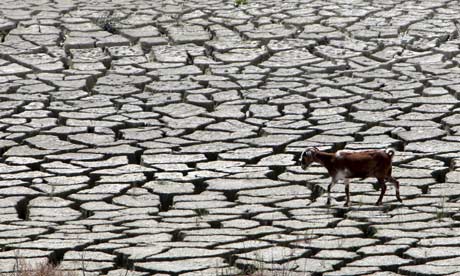Climate change, increased industrial demand and wanton wastefulness: is 'peak water' upon us?

A goat walks along the sun-baked bed of Cyprus's largest reservoir at Kouris. Photograph: Reuters
Peak oil may be the least of our problems, scientists warned today. Growing industrial demand for water in developing countries such as China, rapidly expanding urban populations and the efficiency with which we use water have increased the risk of "peak water" – a resource that most of us presume will be infinite – entering a terminal decline.
Of course, we already knew one of the big eco-bummers of our modern lives is that products from beer to microchips use inordinate amounts of water. Last August, the WWF revealed that each Brit effectively uses 4,645 litres of water a day to produce the food on our tables and the T-shirts on our backs; see our world map for an idea of where Britain's "borrowed water" comes from.
Unsurprisingly, one of the solutions advocated by this new report is a better use of the water we have. To that end, the authors have estimated the water footprint of everyday food and drink, which encouragingly shows that one litre of beer consumes less water (300 litres) than one litre of orange juice (850 litres). One kilogram of coffee is reportedly more thirsty (21,000 litres of water) than one kilogram of hamburger (16,000 litres). Take a look at our image gallery to see the hidden water cost of everything from your daily cuppa to a glass of wine.
According to the report, this is adding up to a global crisis. "We are facing a crisis of running out of sustainably managed water," says Peter Gleick, the author of the sixth edition of the World Water report by California's Pacific Institute. Despite human demand accounting for over 50% of the world's accessible freshwater, the report warns that billions of people still lack access to basic water services. Developing countries, it notes, will suffer worst from peak water because of supply problems exacerbated by flooding, drought and water pollution. Developed countries won't be entirely spared though, as Peter Preston discovered in Spain last year.
The World Water report continues by singling out China as a country in danger of water stress because of its inefficient water use and large projects such as the Three Gorges Dam scheme. "[Chinese] Rivers and lakes are dead and dying, groundwater aquifers are overpumped, uncounted species of aquatic life have been driven to extinction, and direct adverse impacts on both human and ecosystem health are widespread and growing," warns Gleick.
His team also highlights how climate change is adversely affecting water global supplies and its impact on food production.
"The stress on global food production from temperatures alone is going to be huge, and that doesn't take into account water supplies stressed by the higher temperatures," said David Battisti, the lead author of another study published earlier this month.
Gleick's report is keen to stress that the concept of peak water, or more specifically "peak ecological water", isn't completely analogous to peak oil. Unlike oil, some water supplies are infinitely renewable. But even those regions with a water supply that could be exhausted are only likely to suffer peak water locally – whereas peak oil will be a global issue.

No comments:
Post a Comment